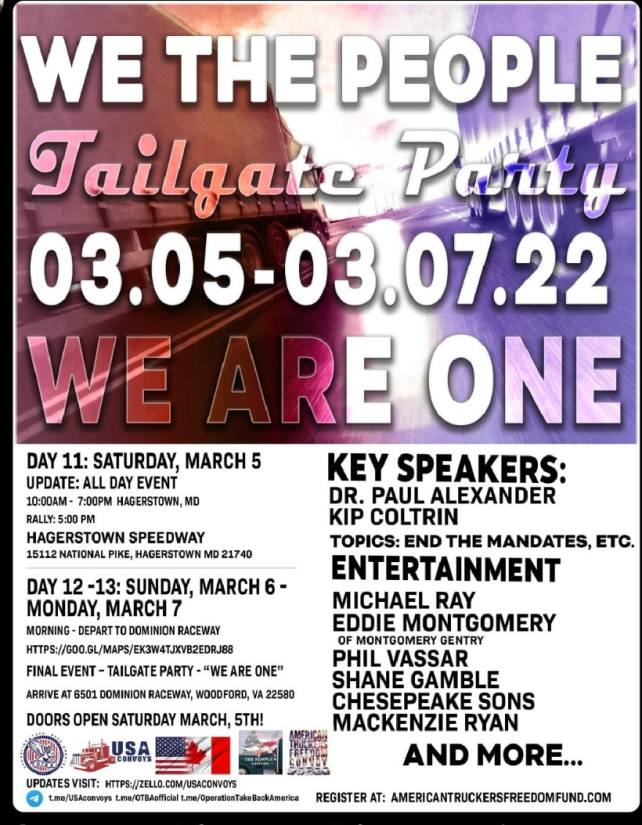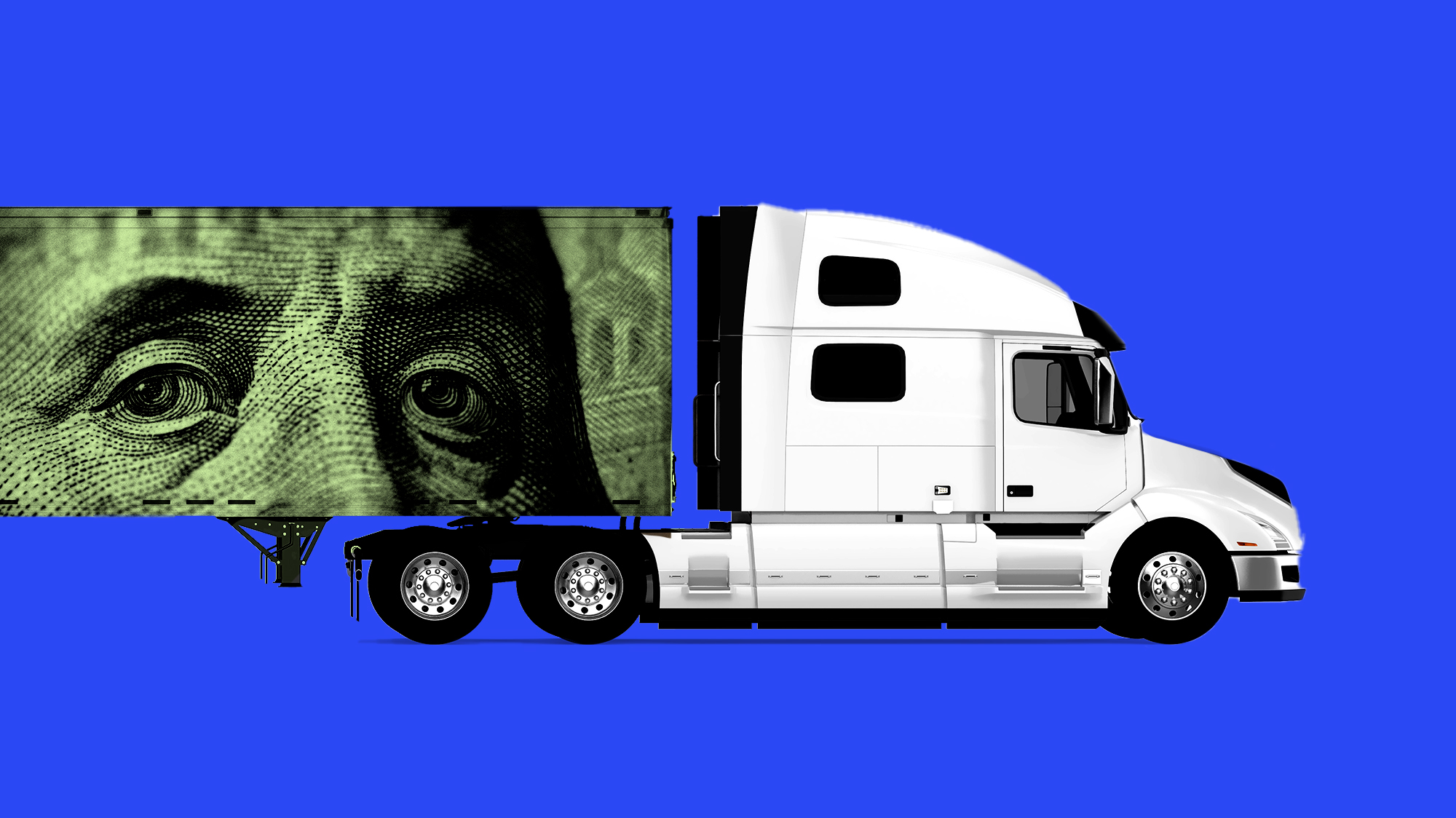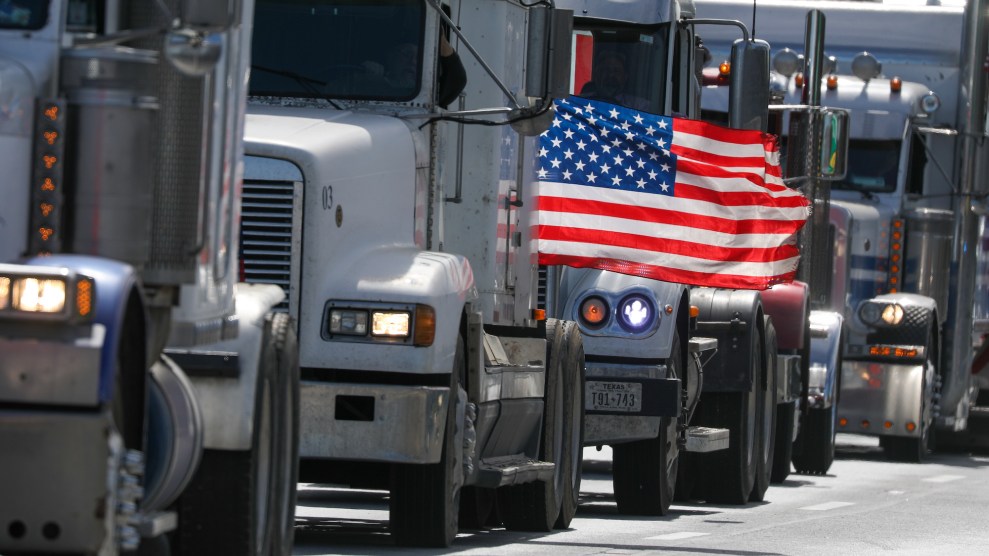Alex Phillips was standing one block from the US Capitol on January 6, 2021, when he warned an interviewer that members of Congress who went along with certifying the results of the presidential election would suffer the consequences in the midterms. As President Donald Trump’s speech at the Ellipse echoed from the loudspeakers, he told the far-right Citizen Media News, “2022 is coming up fast. I’m going to make it my point to do what I can to get these people gone.”
The owner of a small Virginia rural broadband company, Phillips is the founder of American Priority, an outfit that in 2018 started hosting an annual pro-Trump convention known as AMPFest for MAGA fans shut out of more traditional Republican confabs. He had been involved in organizing some of the “stop the steal” rallies in the runup to the insurrection and had been on the permit for and spoken at the “Rally to Revival” in DC on January 5 the night before.
Just hours before a pro-Trump mob rioted at the Capitol behind him, Phillips announced in the interview that he was starting a political action committee called the Great American Patriot Project (GAPP) to get more involved in elections. “We’re going to raise money and we’re going to fund candidates and we’re going to fund corrupt GOP out. We’re going to fund new people in,” he continued, giving out the website and asking for donations. “We’re going to build this organization one state at a time, one candidate at a time.”
On paper, Phillips seemed to make good on his promise. Since then, the PAC has raised nearly $1.8 million, largely from small donors, which would have been a sizable chunk of change in a midterm election where the balance of power in Congress was decided by a razor-thin margin. But that assumes his PAC actually spent any money on political campaigns. How GAPP raised all that money and what it spent it on is an unusual story even in the wild west of campaign finance, where political action committees that raise millions but spend little of it on elections are a major scourge, particularly on the right. The story of GAPP involves trucker convoys, bouncy houses, and country western stars. It also involves exactly zero election campaigns.
After Phillips unveiled its creation on January 6, the Great American Patriot Project’s first move was to announce a three-day strategy retreat focused on retaking control of the White House and Congress from the Democrats. The event, scheduled for Orlando during CPAC, the oldest and largest annual conservative political convention, promised to mix politics with karaoke events, pool, and cocktail parties. The location was undisclosed “in order to ensure the safety of attendees and protect them from violent and often deadly harassment from domestic terrorist organizations like Antifa and BLM,” reported Roger Stone protégé Jacob Engels in a post promoting the event.
Despite Phillips’ promises to get the PAC involved in candidate recruitment and support, its public-facing activities during its first year involved setting up a bare-bones website calling for New York Gov. Andrew Cuomo to be impeached. It also started a social media campaign to “stop the smear” against Rep. Matt Gaetz (R-Fla.), who the New York Times had recently reported was being investigated by the Department of Justice for sex trafficking. Both efforts appear to have been little more than fundraising appeals for GAPP.
In the fall of 2021, GAPP tried to jump on the protests raging over critical race theory in school boards across the country. It created a website that featured a searchable database of names of teachers it had scraped from the Zinn Education Project, which had posted a public pledge signed by teachers committed to teaching the truth about the role of racism in American history. “The parents of America deserve to know if their children’s minds are being poisoned by the racist ideologies that are part of Critical Race Theory,” Phillips said in a press release, adding that he planned to raise $250,000 to out teachers who taught students about systemic racism.
Recognizing that the project could fuel harassment against the teachers it named, the site claimed that “this database is in no way, shape, or form meant to DOXX these individuals, simply hold them accountable for their bigoted beliefs.” Teachers on the list getting harassed, of course, is exactly what happened, according to the Zinn Education Project. Even with promotional tweets from Gaetz and other MAGA luminaries, the project floundered, and the CRT website soon vanished. “We took down the website because we no longer wanted to focus the PAC on this issue,” Phillips wrote in an email. “From our perspective, the public had become aware of this issue.”
By the end of 2021, the GAPP PAC had raised less than $6,000 according to the FEC, and it had given no money to candidates, nor had it made any outside expenditures to support or oppose a federal political candidate—all of which is its ostensible mission. The PAC might have just closed up shop at that point, were it not for the truckers.
In late January, truckers in Canada organized a convoy and headed for Ottawa to protest new regulations that required drivers crossing into Canada from the US to be vaccinated against Covid. The truckers occupied downtown Ottawa, blocked bridges, blasted horns day and night, and tied up traffic across the country for weeks. Eventually, Prime Minister Justin Trudeau declared a public emergency and brought the protests to an end in late February. But their success in headline-grabbing inspired a similar movement in the US.
In late February, the People’s Convoy set off from California and headed to DC, with others joining to converge on the Capitol Beltway in early March. Hundreds of trucks, RVs, and other cars drove in circles around DC tying up traffic to protest everything from vaccine mandates to gas prices. As it had with the CRT protests or the Cuomo impeachment, GAPP was quick to capitalize on the right-wing protest du jour. Only this time, the PAC hired a big-time fundraising firm, Olympic Media, to help with the effort. The company has done digital advertising for people like recently defeated North Carolina Rep. Madison Cawthorn, Matt Gaetz, and Jim Jordan (R-Ohio).
The PAC created a website for the American Truckers Freedom Fund and went on a media blitz to drum up donations with hundreds of social media ads and plugs from Fox News luminaries like Sean Hannity. The site promised to be an alternative to GoFundMe, which in Canada had refused to turn over more than $10 million in donations raised for trucker protests there, after deciding that the protests were inciting violence. It ended up refunding all the money to donors.
GAPP’s website claimed that all donations to its trucker fund would be processed through an “independent fundraising platform” that would “assure that individual truckers receive direct assistance for food, fuel, and supplies.” In fact, the “fund” appears to have been just Phillips’ GAPP PAC, with donations run through the same payment platform as contributions routed through its other websites. Nonetheless, the money poured in.
As hundreds of truckers made their way to DC, emails and social media ads from the American Truckers Freedom Fund started promoting a huge two-day tailgate party at Virginia’s Dominion Raceway to welcome them. GAPP had hired country western stars like Eddie Montgomery to greet the beleaguered drivers and their fans, and brought in bouncy houses for the kids, plus an anti-vaccine doctor and other speakers to entertain all those freedom-loving patriots. “The speedway can hold 10,000 and I wouldn’t be surprised if it is completely full,” Erica Knight, a spokesperson for the event, told the Washingtonian’s Andrew Beaujon.
But on March 6, when the big day arrived, the truckers didn’t. Neither did their fans. The event was by most accounts a huge flop. “The ‘concert’ to ‘welcome’ the ‘convoy’ just started,” tweeted one blogger who was there to watch. “There’s about 5 people present.” As the evening progressed, others posted photos of empty bleachers at the raceway and reports of never-inflated bouncy houses. “There are more trucks parked at the Sheetz around the corner than there are at the convoy rally at the racetrack,” tweeted Molly Conger, from Charlottesville, Virginia, who’s a member of a loosely affiliated group of anti-fascist researchers who track far-right groups.
No matter. Alex Phillips took the stage before a Jumbotron fit for a Super Bowl to promise that the truckers would arrive soon. Meanwhile, he played emcee and introduced the next band, which performed for about 100 people.
so some trucks finally arrived, but the place is still incredibly empty. this is clearly not what the organizers envisioned when they rented out an event space for 5000 people. alex phillips ranted a bit about vaccines & introduced the next band… pic.twitter.com/bxLlB46qlN
— molly conger (@socialistdogmom) March 6, 2022
Some truckers eventually rolled in hours late, but they didn’t stick around very long.
The fundraising effort, however, continued. In the first three months of 2022, largely propelled by the truckers’ project, GAPP raised $1.6 million, mostly from small donors. Did all or even most of that money go to help the truckers and their families as promised? Well, no.
According to Federal Election Commission records, more than 60 percent of the $1.8 million GAPP raised ahead of the midterm election—$1.1 million—went to pay Olympic Media, the fundraiser hired to raise it. “We are a new PAC and do not have a house mailing list of our own of any significance to help expand our reach and get our messaging out there,” Phillips said in an email in response to questions about the fundraising fees. “We are not a marketing company and had we taken on the task ourselves, would likely have spent funds inefficiently, which would not have been in the best interest of our donors.”
The PAC’s second-biggest expenditure went to Phillips’ for-profit company, ALX, which he founded with “stop the steal” organizer Ali Alexander in 2018. The company does business as American First Events and mostly organizes American Priority’s conventions. (Corporate filings in Virginia show that Alexander was removed as a director of the company in 2019.) The PAC paid ALX more than $200,000 for “event management,” golf kart rentals, bouncy houses, and other items apparently related to the tailgate party at the Dominion Speedway.
From donations raised on behalf of the truckers, the PAC even paid ALX $10,000 to sponsor AMPFestWest, one of Phillips’ conventions held in Palm Springs in June, which I attended (until the group tossed me out even after giving me a press pass). At a meet-and-greet on the first night of the convention, three months after most of the trucker protests had ended, organizers unveiled the debut (and only issue) of America’s Convoy Commemorative Magazine, whose cover promised articles like “God’s Chosen Vessels: Truckers.” Promotional copies were available for $9.95.
“AMPFest panels and speakers cover many issues and at that time there were complimentary issues that were at the focus of the GAPP PAC’s mission statement,” Phillips explained in an email. “We thought that ALX Events had the resources and connections to best produce such an event that would best further the interests of the PAC and its supporters.”
The payments to ALX raised enough eyebrows at the Federal Election Commission that, in June, the elections regulator sent GAPP a letter requesting more itemized donor info as well as more detail on what, exactly, those event management costs were really for. It followed up again in September with a letter repeating demands for more donor information and chastising the PAC for sloppy reporting. And again on November 17, the FEC sent the PAC another letter with more questions about its donation reporting and requesting more detail about the fundraising commissions it claimed in its disbursement filings.
ALX “got paid for their services just like any other consultant or any other vendor got paid,” says Christopher Montgomery Woodfin, the PAC treasurer, who blamed the trouble with the FEC on a “glitch.” He told me in an interview that most of the payments to ALX were reimbursements for other vendors the company had paid, though the PAC has paid Woodfin’s firm directly—more than $60,000 since March 1—for legal services.
It’s not illegal for a PAC to pay a company for golf carts, for instance, or even to funnel lots of its money to the company of the guy who founded it. Paul Seamus Ryan, a campaign finance expert who is now deputy executive director of the Funders’ Committee for Civic Participation, says the rules for PACs and political fundraising are minimal. “There are virtually no restrictions on how the money raised into a federal PAC of this sort can be spent,” he tells me.
It is unusual, however, for a PAC to do so much fundraising for activities that have nothing to do with a political campaign. Usually, political organizations set up nonprofits to do the sort of fundraising GAPP did for the trucker protests, if only because it keeps them out of trouble on the tax front. With a nonprofit, they also don’t have to disclose any of their donors or spending as a PAC is required to do. “It is very odd to use a PAC to help fund a trucker protest when the truckers are not running for office,” says Ciara Torres-Spelliscy, a professor at Stetson University law school, where she teaches election law. “The point of running a PAC is that you are raising and spending money to influence an ongoing election.”
Phillips says that the group decided to run the trucker fundraising through the PAC in the interest of transparency in the process “so that all activities associated with this fund would be open to the public and not behind the cloak of a 501c4 or other similar” nonprofit. He explained that the PAC did not get involved in any specific elections or back or oppose any candidates because it wanted to maintain control of how the funds were spent. “Since we did not yet have endless cash reserves to just send out to candidates who may or may not end up making the issues the PAC supports a priority,” he said, “we decided the best way to support the candidates to this point is with messaging and support of their general positions on key political issues.”
Not only did the PAC fail to support or oppose any political candidates in the election, but GAPP also doesn’t seem to have done much to help the truckers it was fundraising for.
The convoy protest started to run out of money not long after the Virginia tailgate party. On March 22, attorney Christopher Marston, who’d run the fundraising arm of the People’s Convoy, told the trade publication FreightWaves that the convoy had only enough funding to survive another week of driving around the Beltway. The reporter informed him that GAPP had been raising money for the drivers. Marston said he was unaware of their financial contribution. “Nobody has reached out to coordinate support and I wish they did,” Marston said.
GAPP’s only expenditure directly related to support for individual truckers appears to be $60,000 worth of gift cards to gas stations the PAC purchased, according to FEC records—slightly less than it paid Woodfin, the PAC’s treasurer. Truckers from the convoys I spoke with said that few truckers had received the gas cards.
“I genuinely tell you nobody got no gas cards,” says Brian Brase, one of the co-founders of the People’s Convoy, the largest of the convoys. “As far as our convoy, the People’s Convoy, none of us was in contact with these people.”
Kip Coltrin is a trucker from Louisiana who organized a separate convoy, American Truckers Freedom Convoy, that went from Fresno to the Dominion Speedway. He worked with GAPP to set up the gas card reimbursement rates, and he says he even encouraged people to donate to the group online after it reached out to him. He was supposed to be a speaker at the speedway rally—his name was in the ads for it—but when he got there, they told him he’d been bumped.

And then, after the event, he had to hound GAPP for the gas reimbursement they’d promised him. He told me he’d taken 46 days off work to direct the convoy, a serious financial hit, and he needed the money. “I was in a situation where I told ’em straight up you’d better get off your ass and get these reimbursements,” he told me. He says he eventually received about $3,800. “There was one other guy who got his. He just stayed on ’em. They did pay him. Beyond him, to date, I haven’t heard of anyone else being reimbursed.”
Coltrin says he has a list of 24 truckers who signed up on the GAPP website to receive reimbursement for fuel costs related to the convoy and have yet to see a dime. He’s been sending Phillips nasty emails since June demanding that the PAC pay up as promised, but he’s gotten no response. “Dealing with them has been nothing but smoke and mirrors and bullshit,” he told me. “At the tail end of March, after the convoys were over, they still had the ads up saying, ‘send your money.’ I told ’em ‘go get fucked.’”
Phillips said that GAPP had a rigorous process in place to ensure that only truckers who participated in a convoy received the financial support. That process included a requirement that they pledge not to break any laws, a hurdle he says probably also deterred some convoy participants from attending the speedway event. He says they investigated claims of people who say they haven’t been paid and “determined that in those cases, the individual had either not formally requested financial assistance through our process, only registered to come to the Concert event, did not follow the verification/application process resulting in an invalid submission, or did not sign the indemnification form.” He says that all but $1,000 of the gas cards have been distributed to legitimate convoy participants.
In an interview, Woodfin couldn’t tell me whether the PAC had provided any support to truckers aside from gas cards and the tailgate party at the Dominion Raceway, which he said accounted for most of the PAC’s expenditures. “The event expense and all of that stuff, that’s all still considered an operational expense,” Woodfin said. “I don’t really separate that from the money that goes to the truckers for the gas cards.”
Brett Kappel, a campaign finance lawyer with Harmon Curran, a DC-based law firm, says the law allows a PAC to give away stuff like gas cards to people “as long as it’s not part of a bargain to vote or register to vote. The Federal Election Campaign Act essentially lets you set your money on fire if you want to.”
In the meantime, all those “corrupt” politicians that Phillips warned last year would suffer the wrath of his new political committee can rest easy. The PAC finished the midterm election season without backing or opposing a single candidate, and now has less than $4,000 in the bank. “A more active FEC would spend more time policing things like this,” says Torres-Spelliscy. “If you’re raising money with a political committee, you should be doing something that supports or opposes a political candidate. You can’t just run the equivalent of your kids’ birthday party using PAC money, even if you invite a lot of people.”








